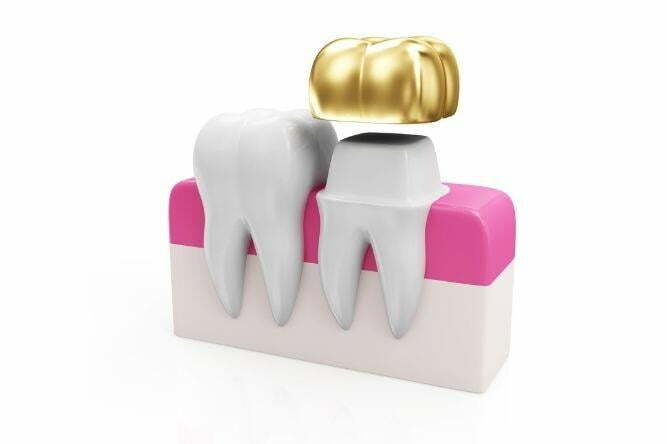If your tooth needs a little extra support, dental crowns are the way to go. Crowns are a bit different than fillings; rather than filling in a small hole, they cover your entire tooth, almost like a cap.
You might need a dental crown if you have a:
- Dental implant
- Broken, discoloured, or cracked tooth
- Root canal infection
- Dental bridge
- Or extensive tooth decay
But not all crowns are created equally. Depending on your budget, gum health, and the location of the tooth, your dentist may recommend one material over another. Which one is right for you?
To help you decide, we’re going to go over each type of dental crown material and explain the differences between them. Consider the following when choosing your dental crown:
Types of Dental Crown Materials
Why is the crown material so important? While some options offer more durability and longevity, others are better suited for a natural look. Here’s an overview of the various materials you can choose from:
Gold crowns
Time has proven that gold crowns are the most durable dental crowns available; they’re resistant to chips, cracks, and corrosion. Of all the crown materials listed here, gold crowns tend to last the longest.
The only problem with a metal crown is when you need dental work on a front tooth. This material is highly visible and will clearly stand out from your other teeth. That’s why most patients choose gold crowns for their back teeth. But if you prefer the look of gold crowns, you can certainly put them over your front teeth!
Silver or metal alloy
These crowns are more affordable than gold ones, with comparable levels of strength and corrosion resistance. You might prefer the appearance (and price point) of a silver crown over a gold one.
Porcelain crowns
Also referred to as ceramic crowns, this material is the most natural-looking of the lot. It’s colour-matched to blend in with your surrounding teeth. An all-ceramic crown can shield your teeth from sensitivity to hot or cold temperatures.
There’s one main downside to ceramic or porcelain crowns: they aren’t as durable as your other options. The material is slightly more brittle than gold alloys.
Porcelain fused to metal
This unique material aims to combine the natural appearance of porcelain with the durability of a metal alloy. The porcelain is on top of the crown, allowing it to blend in with your natural teeth. Underneath is the metal alloy, which helps the crown withstand the pressures of chewing.
These crowns are designed to last for many years. But as the porcelain wears away, it may expose some of the metal near the gum line. Still, porcelain fused to metal crowns are great options for patients who want a natural-looking and durable crown.
Zirconia
Zirconia dental crowns are quickly rising in popularity due to their seamless appearance and strength. Like porcelain, zirconia crowns are made from ceramic. These dental crowns are built up in layers to help them blend in with your existing teeth.
Before your dentist applies the zirconia crown, only a small amount of tooth structure needs to be removed. This is because the material itself is very thin, allowing you to preserve more of your natural tooth.
Choosing Your Dental Crown
Now that you know your options, you might still be wondering which crown material to choose. Here’s what we recommend:
In general, stick to metal materials for your back teeth. Your molars withstand the chewing forces of your jaws, so you need something durable and crack-resistant.
For your front teeth, most patients choose a ceramic option like porcelain or zirconia; these crowns will blend in with your other teeth.
If you’re still undecided, don’t worry! You can ask your dentist which material they recommend.
Benefits of Dental Crowns
Our Winnipeg dental crowns are strong, long-lasting, and custom-made to fit your smile. After a dental restoration, you’ll enjoy the following benefits:
- Cover a discoloured or chipped tooth. Don’t we all dream of uniform, white teeth? A crown will cover your tooth completely, concealing any stains or imperfections.
- Reduce sensitivity. If your tooth enamel is worn away, you might wince whenever you consume hot or cold food. Crown materials are temperature-resistant, so they’ll protect you from experiencing sensitivity.
- Improve the strength of your smile. When you have a broken tooth, you tend to avoid certain foods in fear that they’ll cause pain. But with a crown, you can enjoy your favourite meals once again, from crunchy chicken to raw vegetables!
Taking Care of Your Dental Crown
Even if you choose the most durable material with the longest lifespan, you’ll still wind up with a broken crown if you don’t take proper care of it. What can you do to prevent damage and preserve your crown for longer? Once your new crown is in place, take note of these care tips:
- Maintain your oral health. Even though your crown material is highly durable, it’s not impervious to damage. You still need to care for it, just like a natural tooth! That means brushing twice a day, flossing, and avoiding foods that damage your teeth (like ice, hard candies, and acidic drinks).
- Visit your dentist regularly. Try to schedule dental cleanings twice a year so that your dentist can monitor your teeth and detect any issues early on. If your crown ever becomes loose or damaged, your dentist can adjust and repair it.
Do You Need a Dental Crown?
If you have a broken tooth, we can help. At Affinity Dental, we offer all kinds of restorative dentistry services, including dental implants, root canal procedures, and dental crowns.
Restore your oral health with our wide range of dental procedures. To book your appointment, contact us today!
